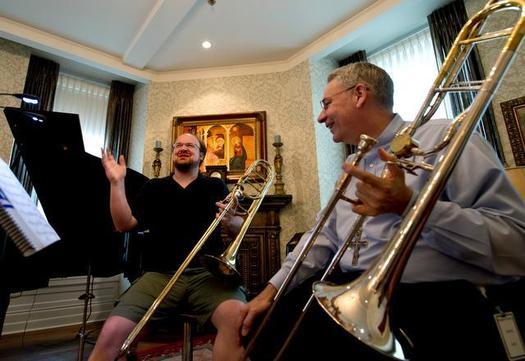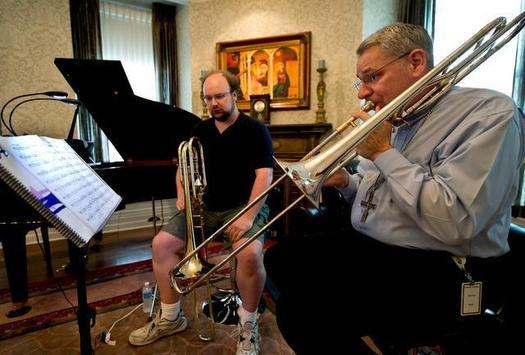Learning Trombone Is a Practice in Humility for Bishop Robert Finn
By Lee Hill Kavanaugh
He didn’t know that Beethoven proclaimed centuries ago that the trombone was “God’s Instrument” because its sound was the closest to the human voice. “God’s instrument? Really?” asks the 60-year-old trombone student, Bishop Robert Finn. He smiles at this holy connection to the silver Conn trombone now perched on its stand. Or maybe he is musing that his own efforts to make a joyful noise are perhaps less Godly, more worldly. “You could say I’m definitely not ready for prime time,” he says. But he’s learning. A scholar, he knows the trombone’s history well. How it was derived from an ancient instrument, the sackbut. How it has changed little over the centuries, its form already close to perfection, while so many other instruments have endured scores of inventions and design changes. He didn’t know that many historians believe it’s the first instrument, other than voice, to play sacred music inside a church. He loves sacred music, he says. “But I especially love Italian operas.” Operas. Those musical soaps where life dramas are exaggerated in soaring tessituras and racy librettos. And in the orchestra, it’s usually a herd of trombones that telegraph death, doom and destruction. Maybe the bishop’s life has felt like an opera, too. He knows well that he will be remembered as the first American Catholic bishop convicted of failing to report a pedophile priest. Painful memories for all. “It was a very, very difficult time,” he says, his body slumping at its mention. “But when you are the leader and you make mistakes, the target is on your back.” He hopes the hate mail won’t rain down again. Maybe the whole ugliness of that experience led this man of God to look inward. A musician can escape the world in those little black notes on white paper. Music captures emotions, tells stories without words. But playing like that takes years of practice. Years of stumbling. “The trombone is a humbling instrument,” he says. His eyes cast to the floor. Finn remembers the music-making of his childhood, in a house with five siblings. He was given a clarinet, then later, a tenor sax. “I was really bad at it,” he says. But it was fun. As an adult, when he was teaching high school religion and Latin, he listened with a musician’s ear to the band practicing. They weren’t very good, he remembers. He learned there was no elementary program filling the ranks of high school with accomplished players. Most were beginners. “My greatest contribution to the music world is probably what I did back then,” he says. He worked to bring elementary band programs into six schools, hired an energetic music teacher and partnered with a music store to offer cheap rentals. The large grandfather clock in his front room chimes the hour, just as his cellphone buzzes. The trombone teacher has arrived. The trombone student is nervous. He’s never played for an audience before. (Although a few months ago, a grinning colleague did inquire about the strange sounds coming from Finn’s apartment inside the old New York Life building.) It takes courage to learn a new skill, to accept being a beginner, struggle with imperfection, quiet self-criticism. Each time a musician practices, he must also practice self-forgiveness. Or else the instrument will stay silent in its case. For two years every Tuesday night, Finn has played for his teacher, 35-year-old Andrew Schwartz, who graduated with his Doctor of Musical Arts a few months ago from the UMKC Conservatory of Music. At first, there were awkward moments. Schwartz wasn’t sure what to call his student, or how to criticize him, or what he would say if his student … got lazy. Schwartz learned. Call him Bishop Finn. Be honest and encouraging. The bishop wants to learn trombone. Discipline won’t be an issue. “He’s not like teaching an eighth-grader, as in the kid who jumps for joy when the lesson’s over,” Schwartz says. “He only misses a lesson when he has to travel — like, to Rome.” Both men laugh. And then it’s time to play. Finn adjusts his trifocals. Leans over, lifts the silver-plated Conn off its stand. His large crucifix clanks against the metal slide. He presses his mouth against the Schilke 52 mouthpiece. His embouchure — the muscles in his face — looks like a pro’s. He takes a breath. The gentle notes of Rochut No. 4 fill the room. A classic in trombone pedagogy. The student plays mostly in tune. His phrasing is rushed just a little. Several notes swell with beauty, with hints of vibrato. A few are clipped short. Schwartz compliments his student’s breathing. The bishop beams. Frank Sinatra was once asked how he learned his lyrical phrasing, connecting words with melodies so perfectly placed, so relaxed. Sinatra credited listening to solos by the great trombonist Tommy Dorsey. Finn has sung thousands of solos during Mass. He sings with legato. And vibrato. Just like a trombonist might play it. Although he doesn’t aspire to play in a group, there might be a time when he plays for a few close friends. “I’m not lining up any gigs, though.” He laughs. The grandfather clock chimes once more. The lesson ends. Few knew the bishop was learning trombone until he bought the instrument from a professional musician. The jazz world is small. Word leaked out. “Playing trombone is a noble pursuit,” Finn says. “You can give glory to God by developing a talent…. It’s an exercise in learning, an exercise in perseverance. Good for pride, too.” His voice is quiet. His hands again clasped. He will keep practicing legatos and scales and lip slurs, forgiving himself for mistakes. And maybe playing God’s Instrument is how a bishop gets his groove back.
|
.
Any original material on these pages is copyright © BishopAccountability.org 2004. Reproduce freely with attribution.

